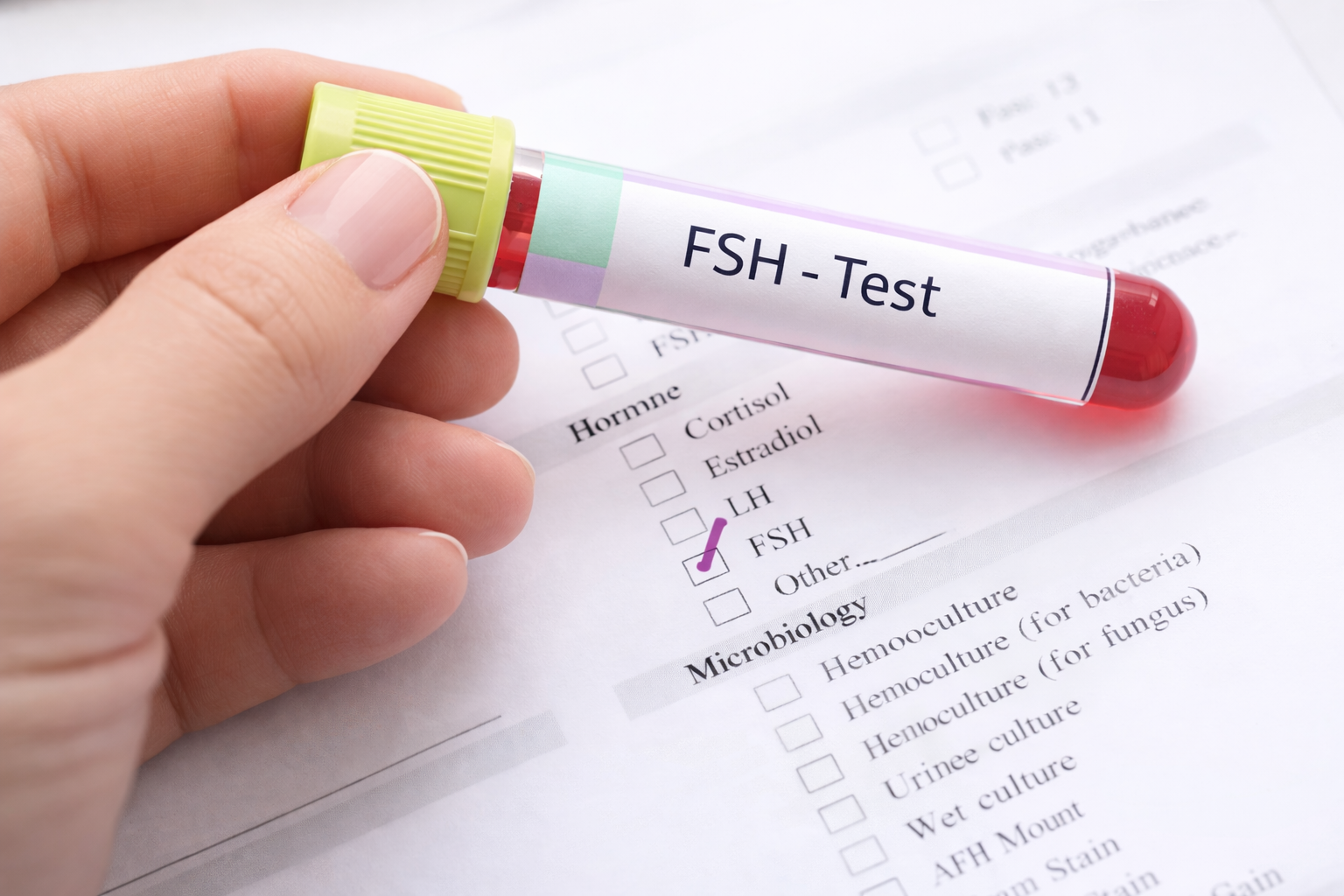Weight gain during perimenopause is common and 100% normal. Here’s why you might be gaining weight during this transition and how to navigate this symptom.

Weight gain during perimenopause is common and 100% normal. Here’s why you might be gaining weight during this transition and how to navigate this symptom.
Maybe you’re keeping your same habits, but starting to notice weight gain as you’re getting older—particularly as you reach your mid 40’s. While perimenopause is known for symptoms like hot flashes and mood swings, perimenopause weight gain is very real. This symptom can be frustrating, emotional, and even negatively affect your overall health. Here’s what you need to know about perimenopause weight gain causes, how long it lasts, and how to navigate it.
Research indicates that the majority of women experience some degree of weight gain during perimenopause, with many gaining 5 to 10 pounds during this transition. Understanding why perimenopause weight gain happens and knowing it's a normal part of the hormonal journey can help you approach this change with knowledge and self compassion.
What causes perimenopause weight gain?
Many of the horrible perimenopause symptoms happen because of hormonal fluctuations during this transition period; however, perimenopause weight gain doesn’t happen only because of these hormonal changes, but rather a mix of hormonal, aging, genetic, and lifestyle factors.
While estrogen gets most of the attention, declining progesterone levels also contribute to perimenopause weight gain. Progesterone helps regulate metabolism and has a natural diuretic effect. When progesterone drops, often before estrogen begins to decline, women may experience:
- Increased water retention and bloating
- Slower metabolic rate
- Changes in how the body stores fat
- Increased cortisol sensitivity, promoting abdominal fat storage
Understanding both hormones' roles helps explain why perimenopause weight gain can begin years before your final period.
According to a review of literature on weight gain at menopause, “while weight gain per se cannot be attributed to the menopause transition, the change in the hormonal milieu at menopause is associated with an increase in total body fat and an increase in abdominal fat.”
What does this mean? The hormone changes that happen during perimenopause like fluctuations in estrogen and perimenopause are not solely responsible for overall weight gain. Instead, perimenopause weight gain comes from a mix of factors, like:
- Redistributed fat: As estrogen decreases, the body may redistribute fat to the abdominal area, leading to an increase in visceral fat.
- Slowed metabolism: As we age, our metabolism slows down, making it easier to gain weight and harder to lose it.
- Changes in sleep patterns: More erratic and less frequent sleep often caused by other perimenopause symptoms can affect dietary choices and physical activity levels.
- High stress: Stress, which is common during this transition, can trigger the release of cortisol, a hormone associated with increased abdominal fat.
- Insulin resistance: Estrogen can help maintain insulin sensitivity, which helps us avoid insulin resistance. When estrogen levels decline, we are at higher risk for insulin resistance, a condition that makes it harder to regulate blood sugar and can increase the likelihood of weight gain.
- Genetic and biological factors: Some women may be genetically predisposed to gain weight during this phase, while others may not experience significant changes.
Perimenopause weight gain therefore arises from a variety of factors some hormonal, some due to aging, others due to lifestyle and genetic factors.
Why is it so hard to lose weight during perimenopause?
It’s hard to lose weight during perimenopause because your hormones, aging body, and lifestyle factors are working against weight loss.
Perimenopause leads to a decrease in estrogen, which is associated with metabolism deficiency. Aging is also related to a decrease in muscle mass, which also negatively impacts our metabolism.When our metabolism decreases, we burn fewer calories overall, making it harder to lose weight, even if we’re eating just as much as we were before.
Estrogen also helps manage our hunger signals, like when our body tells us when we’re full. When estrogen decreases, we don’t get those same signals, and are more likely to eat in excess. Lifestyle factors work similarly if we don’t get enough sleep, for example, we’re more likely to choose less nutritious food options and eat in excess.
The Role of Hormone Testing in Weight Management
Tracking your hormones during perimenopause can provide insights into weight changes. When you understand your unique hormone patterns, particularly the relationship between estrogen and progesterone, you and your healthcare provider can better tailor weight management strategies. Some women find that addressing specific hormonal imbalances helps make weight management more achievable during this transition.
How long does perimenopause weight gain last?
Perimenopause weight gain can last about as long as perimenopause does, which is about four to eight years, but can vary greatly from person to person.
Weight gain often starts in the early stages of menopause, and often becomes more pronounced as estrogen levels decline and hormones begin to fluctuate more as you reach menopause. However, some people may experience weight fluctuations for a shorter duration, while others may find it persists over a longer period. Some may also notice gradual changes, while others may experience more pronounced shifts.
Once menopause is reached, hormonal levels stabilize and perimenopause weight gain tends to plateau.
It can be frustrating not to know what to expect from perimenopause weight gain. Will your weight gain be more gradual or pronounced? Will it happen quickly or toward the end? Every person is unique, and their experience of this symptom is unique. While that can be challenging, it means that maintaining your health is a unique, personal journey.
Treatment for perimenopause weight gain
Let’s get the important part out of the way: weight gain during perimenopause is not necessarily a negative thing. We’ve been taught that weight gain is always troublesome, but carrying a few extra pounds isn’t always bad, it’s natural for your body to change and fluctuate over time.
Perimenopause weight gain can be a problem, however, if it affects your overall health. For example, overweight and obese menopausal women are at a greater risk of cardiovascular complications and diseases, osteoporosis, and cancers. Weight gain can also exacerbate certain perimenopause symptoms, like bone-related issues such as joint pain.
So if you are looking to lose weight during perimenopause, what are your options?
Natural ways to lose weight during perimenopause
There are a few ways to naturally lose weight during perimenopause, by changing various lifestyle factors:
- Regular physical activity: Muscle mass often decreases with age, which can affect your metabolism during this transition period. Engaging in regular exercise, specifically strength training that builds muscle, can help counteract this effect and boost your metabolism. High-intensity training has also shown to reduce risk factors for type 2 diabetes and cardiovascular disease
- Balancing your diet: Adopting a balanced and nutritious diet of whole foods (vegetables, fruits, lean proteins, whole gains, and healthy facts) and limited processed foods, sugar, and saturated fats can help promote overall well-being.
- Stress management: Chronic stress, which often arises during perimenopause, can lead to hormonal changes that increase your appetite and cravings for less nutritious, higher-calorie foods. Managing stress and incorporating stress-reducing techniques such as yoga, meditation, deep breathing exercises, or hobbies can help manage cortisol levels and support weight control.
- Adequate sleep: Inadequate sleep, which happens often during perimenopause due to hot flashes and night sweats, can impact hormones that regulate hunger cues. Establishing a consistent sleep routine can help support overall health and weight management.
Timing Matters: Exercise and Your Cycle
During perimenopause, when you exercise can be as important as how you exercise. Consider:
- Higher progesterone days: Focus on gentler activities like yoga or walking
- Lower hormone days: Take advantage of increased energy for strength training
- Post ovulation: Prioritize recovery and stress reducing activities
Nutrition Strategies for Hormonal Balance
Beyond general healthy eating, specific nutritional approaches can support hormone balance and healthy weight during perimenopause:
- Protein at every meal: Aim for 25 to 30 grams to support muscle mass and metabolism
- Cruciferous vegetables: Broccoli, cauliflower, and Brussels sprouts support healthy estrogen metabolism
- Fiber rich foods: Help regulate blood sugar and support hormone elimination
Healthy fats: Omega 3s from fish, nuts, and seeds support hormone production
Perimenopause weight gain supplements
While it's important to focus on a well-balanced diet for overall health and managing perimenopause weight gain, some supplements may be considered to support specific nutritional needs during this transitional phase. It's crucial to consult with a healthcare professional before adding any supplements to your routine, as individual requirements can vary.
Here are some of the best supplements for perimenopause weight gain:
- Calcium and vitamin D: Hormonal changes during perimenopause can impact bone density. Calcium and vitamin D supplements may be recommended to support bone health and reduce the risk of osteoporosis. Adequate calcium intake is essential for maintaining strong bones, and vitamin D aids in the absorption of calcium.
- Omega-3 fatty acids: Omega-3 fatty acids, found in fish oil supplements, may help manage inflammation and support heart health. As women age, maintaining cardiovascular health, especially when weight gain puts you at risk for cardiovascular problems, becomes increasingly important.
- B Vitamins: B vitamins, including B6 and B12, play a role in metabolism and energy production. As metabolism tends to slow down during perimenopause, B vitamin supplements may support energy levels.
- Probiotics: Gut health is increasingly recognized as important for overall well-being. Probiotic supplements can help maintain a healthy balance of gut bacteria, supporting digestion and potentially aiding in weight management. Probiotics are also found in fermented foods like yogurt and kefir.
- Hormone support supplements: Hormone-supportive supplements like phytoestrogens (found in soy products) or adaptogenic herbs, have been shown to play a role in weight loss. However, these should be approached with caution and under the guidance of a healthcare professional.
Always remember that supplements should complement, not replace, a healthy diet. It's important to obtain most nutrients from a well-balanced and varied diet, and supplementation should be tailored to individual needs and health status. Regular monitoring by a healthcare provider can ensure that supplements are used safely and effectively.
Hormone replacement therapy (HRT)
Because hormone fluctuations during perimenopause play a part in weight gain, hormone replacement therapy can help balance those hormone levels to help alleviate this symptom. HRT can help replace lost levels of estrogen and progesterone and promote hormonal balance. However, the decision to pursue HRT should always be made in consultation with a healthcare provider, weighing potential risks and benefits.
Overall, addressing perimenopause weight gain, if weight gain is affecting your overall health, can involve a combination of lifestyle adjustments, potential supplements, and hormonal considerations. By taking a comprehensive approach and making sustainable changes for your unique health, you can manage weight gain effectively and boost your overall well-being.
When to Talk to Your Healthcare Provider
While some weight gain during perimenopause is normal, certain situations warrant medical consultation:
- Sudden, rapid weight gain (more than 2 to 3 pounds per week)
- Weight gain accompanied by extreme fatigue or hair loss (possible thyroid issues)
- Inability to lose weight despite significant lifestyle changes
- Weight gain affecting your physical or mental health
- Interest in hormone therapy or medical weight management options
According to Mayo Clinic, unexplained weight gain or difficulty losing weight can sometimes indicate underlying conditions beyond perimenopause that need evaluation.
Perimenopause Weight Gain, The Bottom Line
Perimenopause weight gain is a common experience shared by millions of women. Your worth isn't determined by the number on the scale, and your body is navigating a significant transition. Be patient with yourself, focus on overall health rather than just weight, and seek support when you need it.
Frequently Asked Questions
At what age does perimenopause weight gain typically start?
Perimenopause weight gain can begin in your late 30s or early 40s, often coinciding with the first hormonal changes. Many women notice gradual changes starting 5 to 10 years before their final period. The timing varies greatly based on genetics, lifestyle, and overall health.
Is perimenopause weight gain different from regular aging weight gain?
Yes. While metabolism naturally slows with age, perimenopause weight gain has distinct characteristics. The hormonal shifts cause fat redistribution to the midsection, even if overall weight doesn't change dramatically. This abdominal weight gain pattern is specifically linked to declining estrogen and progesterone, not just aging.
Can you prevent perimenopause weight gain completely?
While you may not prevent all weight changes during perimenopause, you can minimize gain through proactive strategies. Starting strength training before perimenopause, maintaining consistent sleep habits, and managing stress can help your body adapt to hormonal changes more smoothly. Remember, some body changes during this transition are normal and healthy.
Does everyone gain the same amount during perimenopause?
Perimenopause weight gain varies significantly. Some women gain 5 pounds, others 20 or more, and some maintain their weight. Factors include genetics, starting weight, activity level, stress, sleep quality, and how dramatically hormones fluctuate. Your experience is unique to your body.
Will the weight come off after menopause?
Perimenopause weight gain often stabilizes after menopause when hormones level out, but the weight doesn't automatically disappear. The metabolic and body composition changes that occur during perimenopause tend to persist. However, with consistent healthy habits, weight management becomes more predictable post menopause than during the fluctuating perimenopause years.
About the author

Sources
- De Paoli, M., Zakharia, A., & Werstuck, G. H. (2021). The Role of Estrogen in Insulin Resistance: A Review of Clinical and Preclinical Data.
- Desmawati, D., & Sulastri, D. (2019). Phytoestrogens and Their Health Effect.
- Gorin, Amy. (n.d.). How Stress Can Lead to Weight Gain, and How to Fight It.
- Kodoth, V., Scaccia, S., & Aggarwal, B. (2022). Adverse Changes in Body Composition During the Menopausal Transition and Relation to Cardiovascular Risk: A Contemporary Review.
- Mandrup, C. M., Egelund, J., Nyberg, M., Lundberg Slingsby, M. H., Andersen, C. B., Løgstrup, S., Bangsbo, J., Suetta, C., Stallknecht, B., & Hellsten, Y. (2017). Effects of high-intensity training on cardiovascular risk factors in premenopausal and postmenopausal women.
- Mauvais-Jarvis, F., Clegg, D. J., & Hevener, A. L. (2013). The role of estrogens in control of energy balance and glucose homeostasis.
- Patni, R., & Mahajan, A. (2018). The Metabolic Syndrome and Menopause.
- Sternfeld, B., Wang, H., Quesenberry, C. P., Jr, Abrams, B., Everson-Rose, S. A., Greendale, G. A., Matthews, K. A., Torrens, J. I., & Sowers, M. (2004). Physical activity and changes in weight and waist circumference in midlife women: findings from the Study of Women's Health Across the Nation.
- YaleNewHavenHealth. (n.d.). Does Lack of Sleep Cause Weight Gain?
About the Oova Blog:
Our content is developed with a commitment to high editorial standards and reliability. We prioritize referencing reputable sources and sharing where our insights come from. The Oova Blog is intended for informational purposes only and is never a substitute for professional medical advice. Always consult a healthcare provider before making any health decisions.



